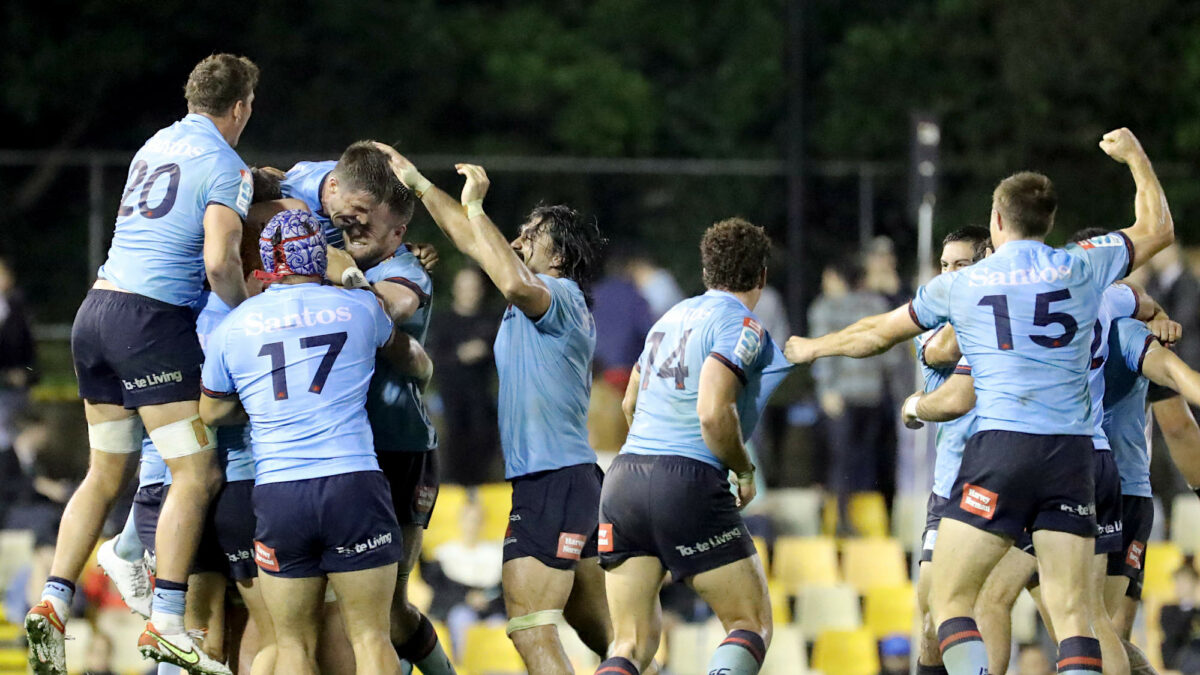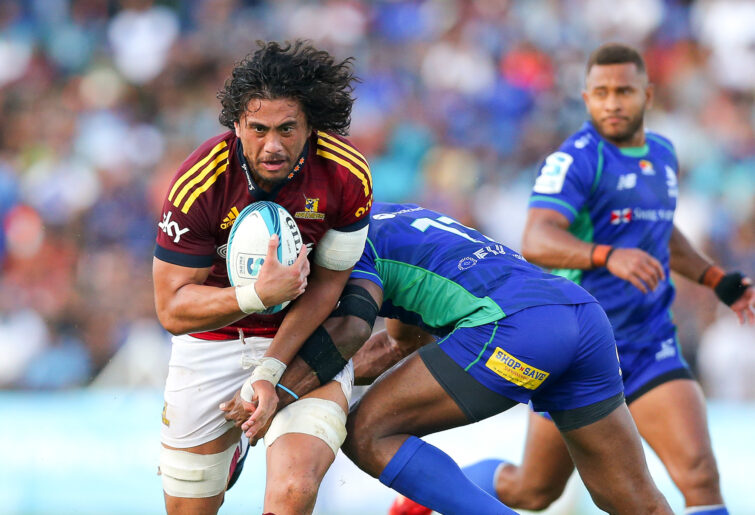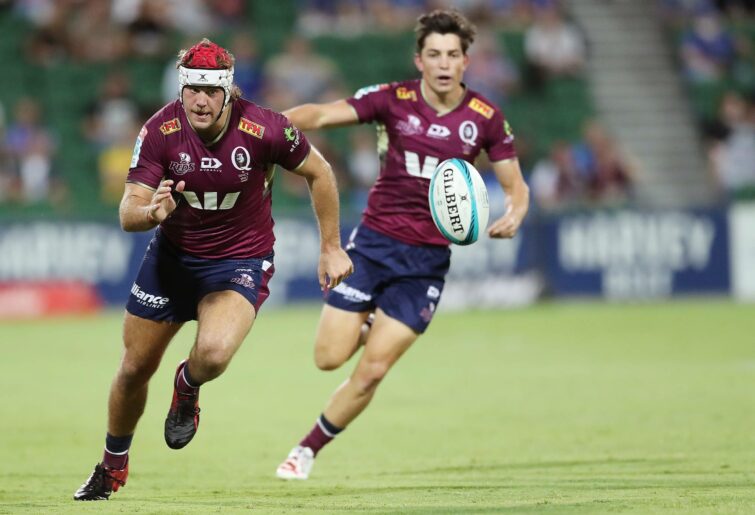
If indeed Super Rugby Pacific becomes the trans-Tasman and pan-Pacific rugby behemoth we’d all love it to become in the years to come, we might just have to look back at what shaped as an otherwise garden-variety weekend in 2022 as the point where the fledgling competition took great strides forward.
Coming off the Super Round the previous weekend, there were glimpses of good signs, particularly from the Australian teams, but it still wasn’t so convincing that anyone really saw the Round 11 results coming.
Instead, we got to sit back and enjoy, as the round produced six thoroughly engrossing and highly entertaining games.
Heading into the Brumbies-Hurricanes games on Sunday, the first five games all saw losing bonus points handed out, and with the five winning margins coming in at two, four, three, three, and four points respectively.
And I’m not sure this has ever happened before over the history of Super Rugby. I’ll absolutely stand corrected if anyone wants to spend the time confirming it one way or the other.
My spreadsheets go back to 2014, and after spending maybe ten minutes skimming over nine seasons worth of results, the closest I can find is the last five games of Round 5 in 2017, in which five losing bonus points were again earned, but with bigger margins.
Whatever the history books say, this was a fantastic weekend for the competition, and it really feels like everything we thought we knew going into the last month of the regular season has been thrown on its head.
The Chiefs’ win over the Reds on Friday night saw them replace the Queenslanders in the top four. Bailey Kuenzle will still be ruing his three missed conversions for the Force later the same night, the last of them hitting the left upright. Close misses and all, but six missed points in a four-point loss are going to sting for a while yet.
And worse, the Rebels’ holding on for dear life over Moana Pasifika on Saturday night saw them leap-frog the Force into eighth. The Highlanders beating the Drua in Suva puts them only one point behind the Western Australians, too.

Marino Mikaele-Tu’u of the Highlanders is tackled by Vinaya Habosi of Fijian Drua. (Photo by Hagen Hopkins/Getty Images)
The sight of the National Stadium in Suva packed to capacity was incredible on Saturday afternoon, but the noise coming through my screen sounded like a lot more than 15,000 people were in attendance. The crowd in the end matched expectations from earlier in the week, but earlier in the week not many had bought tickets! ‘Fiji time’ is clearly alive and well again.
But this game in Suva added a new element to Super Rugby, just as the Drua’s return game in Lautoka against the Chiefs in the final round before the final will as well. It was a reconnection with the Fijian people starved of seeing their team in the flesh, and the joyous scenes were impossible to ignore.
The strength of the Drua home crowd meant that the result was almost inconsequential, though of course the moment would have been elevated to an even higher standing had the Drua found points in the second half and gone on with to beat the Highlanders after their excellent first half.
Super Rugby Pacific in its current guise has another season to run, but discussions about the future beyond the end of the 2023 season will begin soon enough. And they’re hugely important for both Rugby Australia and New Zealand Rugby as they look to consolidate the finances as we emerge from two incredibly difficult years.
The recently announced financial year results highlight the improvements on both side of the Tasman, but there is still great improvement needed. RA posted a loss of $4.5 million last week, and NZR announced a NZ$5.5 million profit – albeit with a $15 million advance from World Rugby on RWC2023 funding.
Crucially, for both unions, revenue is on the up again, and both unions have significant earnings on the horizon in the form of a Lions Tour and very probably two Rugby World Cups in Australia, while NZR edge closer to finalising their deal with private equity firm Silverlake.
But this weekend – and last weekend’s Super Round, for that matter – should have shown both unions that there is still much to be gained from properly backing Super Rugby Pacific and allowing this competition to develop independently and organically.
And that’s going to need investment across a number of fronts.
For one thing, the competition desperately needs its own governing body. One of the biggest and best provincial professional rugby competitions in the world deserves significantly better than the current amateur rugby-like sub-committee arrangement between the two unions.
It’s worked okay this year with the border restrictions forcing a less than ideal demarcation, but at the first step of reunification – last weekend’s event in Melbourne – it failed at so many points: logistics, administration, communications, and most definitely marketing and promotion. The time for self-interest to be set aside and Super Rugby to run like a proper, professional rugby competition is now.
The Australian sides also desperately need their annual funding restored to their pre-COVID levels, too. And not just to throw at players they’re trying to dissuade from Japanese advances and other overseas opportunities, but so that the states can finally start rebuilding their own coaching and conditioning programs back to where they need to be.

(Photo by Will Russell/Getty Images)
There’s nothing wrong with streamlining operations and finding cost efficiencies, but professional rugby teams playing in professional rugby competitions need professional level off-field support, too.
And yes, some investment in players will be needed. Just as Australian rugby is seeing the benefits that came with the investment of that famed 2019 Junior Wallabies program, those overseas clubs now seek younger talent.
“I said at the time it takes three years to become a really good Super Rugby player unless you’re an absolute freak and can just jump into it,” Waratahs defence coach Jason Gilmore said in Sydney yesterday.
“It’s 2022 now, those boys are three years older, they’ve experienced Super Rugby for three years and they understand the needs now that they’ve played the Kiwis for two years. They’re understanding the level they need to be at.
“The coaches have been patient with them, whereas five or six years ago a lot of those boys would have been spat out, they’d be overseas after 12 months because they couldn’t handle Super Rugby.
“So, I think the patience in the development in all the franchises across Australia has been really good and that’s why you’re now seeing them get regular starts and pushing into Wallabies squads.”
And having been the guy with the clipboard guiding that young squad three years ago, Gilmore makes a fair point. The challenge for Rugby Australia now – with the reward coming for Super Rugby in a few years’ time – is to get that Under-20s program reinstated to those 2019 levels as soon as possible.
The depth in the Australian squads is better in 2022 than it was, maybe even only last year. But it can always be improved and the competition quality increases as a whole when it does.
This weekend just gone was great not just for the closeness of games or the unpredictability of the results or even the quality of the rugby, but because it gave us a glimpse of what Super Rugby Pacific could look like every week in the coming years.
But to do that, everyone involved needs to start looking at the big picture now.
And if we manage to do that, then we’ll look back in a few years’ time, with the competition flying, and we’ll remember it was that otherwise garden-variety April/May weekend in 2022 where Super Rugby Pacific reintroduced itself to rugby fans the world over.